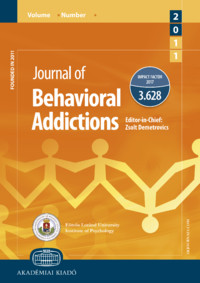On being loyal to a casino: The interactive influence of tier status and disordered gambling symptomatology on attitudinal and behavioral loyalty
On being loyal to a casino: The interactive influence of tier status and disordered gambling symptomatology on attitudinal and behavioral loyalty
Author(s): Samantha J. Hollingshead, Michael J. A. Wohl, Christopher G. DavisSubject(s): Behaviorism
Published by: Akadémiai Kiadó
Keywords: casino loyalty programs; disordered gambling; attitudinal loyalty; behavioral loyalty; tier status
Summary/Abstract: Background and Aims: Casino loyalty programs are marketing strategies designed to foster attitudinal (i.e., identification and satisfaction) and behavioral (i.e., spending) loyalty among gamblers by offering rewards to members. Casino loyalty programs use a tier-based structure to segment members who spend more money into higher tiers, where they receive better rewards (compared to lower tiered members). Tier-based structures may encourage increased expenditure among patrons, especially among players living with a gambling disorder. The current work aimed to examine whether tier status and disordered gambling symptomatology interact to predict attitudinal and behavioral loyalty. Methods: Study 1 used a cross-sectional design to examine whether tier status and disordered gambling symptomatology interact to predict self-reported loyalty among a sample of American casino loyalty program members (N 5 396). In Study 2, archival player account data from Canadian casino loyalty program members (N 5 649) were analyzed to examine whether tier status and disordered gambling symptomatology interact to predict objective measures of behavioral loyalty. Results: The greatest effect of tier status on attitudinal and behavioral loyalty was observed among non-problem gamblers in the highest tiers. Tier status, however, did not influence loyalty among members high in disordered gambling symptomatology. Discussion: Results suggest that once gambling has become problematic, loyalty programs may not influence player attitudes and behaviors. Non-problem gamblers may be particularly susceptible to the tiered structure of the programs. Conclusion: Non-problem gamblers may benefit from casino loyalty programs in the short-term but longitudinal research is needed to understand the long-term influence of membership
Journal: Journal of Behavioral Addictions
- Issue Year: 10/2021
- Issue No: 3
- Page Range: 675-682
- Page Count: 8
- Language: English

